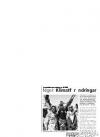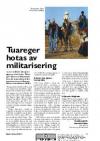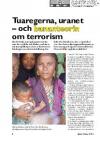Nomads who cultivate beauty : wodaabe dances and visual arts in Niger
| Upphovsperson: | Bovin, Mette |
|---|---|
| Utgivare: | Nordiska Afrikainstitutet | Uppsala : Nordiska Afrikainstitutet |
| År: | 2001 |
| Ämnesord: | Niger, West Africa, Anthropology, Nomads, Social anthropology/ethnography, Socialantrolopologi/etnografi |


